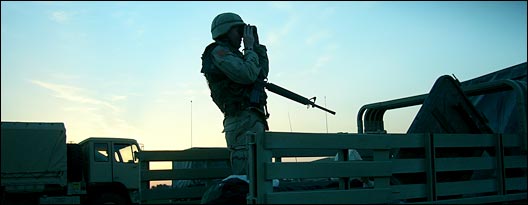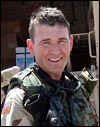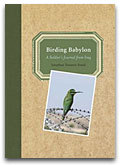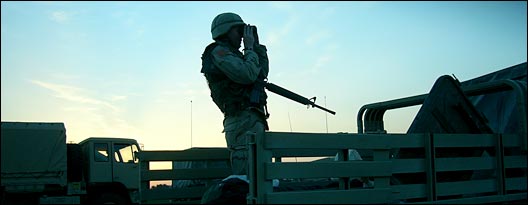
Glassing the evening sky for feather and foe.
Photo courtesy of Jonathan Trouern-Trend.
Jonathan Trouern-Trend has been a dedicated bird-watcher since he was about 12. So in 2004, when the now 38-year-old Connecticut National Guard sergeant got sent to Iraq, he had birds on the brain. While stationed at Camp Anaconda — a huge American installation located about 40 miles north of Baghdad in the Sunni Triangle near the Tigris River — Trouern-Trend got to know the better birding spots on the base, including a small lagoon and the camp dump. Since he was working in intelligence, the base MPs didn’t pay much attention as he peered through his binoculars. He recorded his observations anonymously on the blog Birding Babylon, and the matter-of-fact reports eventually attracted a wide readership.

Jonathan Trouern-Trend.
Readers took solace in Trouern-Trend’s observations of nature in the midst of a situation that seemed to be spinning out of control. “When I go to vote on Tuesday,” wrote one blog commenter in September 2004, “I will look at the birds and take courage in the fact that — as serious and as real as they are — war and politics are only a small part of life.” That same month, another wrote that she pictured Iraq “as barren and rubble! Who would have thought birds and butterflies would find havens there! We appreciate your reports and look forward to more … and your safe return.”
Trouern-Trend spent a little more than a year on active duty in Iraq and Kuwait, and saw 122 different bird species. His observations have now been collected in a slim, illustrated book also titled Birding Babylon, published by the Sierra Club. While it might seem impossible for a book about the Iraq war to leave politics aside, this volume is purely an appreciation of nature — wherever it may be found.
Today Trouern-Trend is back home in Connecticut, where he works in epidemiology for the American Red Cross and has recently created an interactive site devoted to the natural biodiversity of Iraq. Grist spoke with him by phone a day after he had taken his five children to the zoo in Providence, R.I.
Tell me how your posts ended up as a book.

Birding Babylon, by
Jonathan Trouern-Trend,
Sierra Club Books,
64 pgs, 2006.
The book came about because someone from the Sierra Club called and asked if I’d be interested. I agreed that it was a good idea. I’d started writing my magnum opus on the natural history of Iraq — which would probably take 20 years — but these are not mutually exclusive. This book will probably get a few more people interested.
Are you pleased with how the book came out?
It’s a little sparse on details. I was the intelligence sergeant for the battalions. Sometimes I didn’t want to describe areas in extreme detail, or talk about individuals who worked with us in enough detail that someone might have been able to identify them.
I’ve had mostly positive comments about the book, although one librarian said it was trite. I realized after reading some of his other work that he thought it would have been a great vehicle to make a political statement.
Which it very much does not.
Yes. I think he felt I had squandered this great opportunity. Hopefully it will be seen in a more positive light by others. You want to listen to your critics, but you don’t have to buy it all.
What motivated you to blog about birds from Iraq?
I was trying to get a handle — before I went — on what was going on there, beyond CNN. I started reading some soldiers’ blogs, and decided it was a good medium to work with. One purpose was an outlet to write down my observations. I also knew that no one had done any fieldwork in Iraq — at least any published in English — for 20 years. So from the standpoint of bird records, I thought it would be of value.
But I also intuitively knew that other people would be interested — because this is not how most Americans think about Iraq.
I found blogging useful in many ways. My superiors knew what I was doing and had no problem with it. It’s often the other layers of bureaucracy that feel like they need to put their two cents in. I kept the letter and the spirit of the law, I think.
By blogging anonymously and keeping details suppressed?
Yes. People were guessing I was in the south, the north. Even people on my base were leaving messages saying, “Hey, if you’re ever up in Anaconda …” I really didn’t care about getting the personal attention. Sometimes I think a lot of people blog to make themselves look good. Mine had a different purpose.
Thinking about it since, this was also a way of making connections with people who might not otherwise have connections with anyone in the military. It’s a different demographic.
And you did get a huge response from that demographic, didn’t you?
Yes. A couple people started looking at it. And then people mentioned it on listservs. Then I got an email from a producer from NPR’s Weekend Edition, and I did an interview. After that tons of people started visiting. Some were pretty touched that there was something good going on in Iraq: “OK, the birds are migrating through.” How many people can identify with bombs going off, or getting rocketed? So seeing my observations juxtaposed with what they saw on the news made them feel that it was not total chaos in Iraq, a total loss of every semblance of human society, dignity, normality.
Truth be told, it was “normal” in some sense most of the time. We were one of the most frequently rocketed and mortared places in Iraq, because we were the logistics hub for the entire country. But it was not like total chaos all the time. They would never send a rocket or mortar our way before let’s say 5 or 6:30 in the morning, or after midnight. So you could have a kind of day-to-day existence. People got killed on our base, and quite a few got injured, but … you couldn’t run around all day worrying you were going to get hit by something. My attitude is always, “If it’s your time, there’s nothing you can do about it.”
So how was your wildlife-spotting received by your colleagues?
I’m always seen as somewhat of an oddity. “Ah, that’s Sgt. Trouern-Trend. He’s bird-watching, or out there catching a lizard.” I enjoyed my time there as much as I could. I got to go to some fascinating places. I was in Babylon, and went down to the ruins of Ur, where Abraham was supposed to have come from. Those things, maybe I could appreciate them more than your average soldier who’s younger than me, and might have different priorities.
I’ve talked to some military folks who say, “Well, obviously he had too much free time.” But really, it was just little snapshots here and there. I’d say, “Yes, and how long did you spend playing Xbox every day? Or watching satellite TV?” It’s just how people used their time.
Did you connect with Iraqis who shared your interests?
To the extent I could. There were a lot of Iraqis who worked on our base; some were farmers. I chatted with them about the animals they saw. Sometimes they would bring me bugs. And then the supervisors, we’d have more in-depth conversations about the date palms, and their importance, and what sort of critters were a problem with them — I guess they had some sort of a weevil. I think they felt I was interested in both their observations and in their culture. I tried not to be the Ugly American.
Did you perceive any contradiction between being on a military mission and being a naturalist?
I never did, too much. I’ve observed [in the U.S.] that military reservations tend to be the best-preserved spots in some areas. On Cape Cod, the Camp Edwards military reservation is probably the biggest stretch of pinelands there. So I don’t think they’re necessarily mutually exclusive.
More Words of War
Want to read more about the links between war and the environment? Check out these other new titles.
Defiant Gardens: Making Gardens in Wartime explores how seeds and spirit helped people survive the 20th century’s most brutal battles.
How Green Were the Nazis?: Nature, Environment, and Nation in the Third Reich sheds light on the lesser-known aims of the notorious party, from regional planning to pollution laws.
But I understand what you mean. You could make a case about the depleted uranium, the anti-armor rounds that have depleted uranium heads in them. One of our contractors had a master’s degree, and did his thesis on contamination around these tanks. When it comes to environmental pollution, those are probably a minor issue. People get really bent out of shape because [they’re threatened by] radioactivity. Even though eating mercury will kill you faster, and is more likely to, than walking by some old tank. But children playing on it, goats grazing at it — probably not a good idea either.
I can say for sure that Saddam was no environmentalist. I was reading something from the Yale School of Forestry: Iraq is [near] the bottom of their list of countries in environmental quality. One of the reasons is that the Tigris and the Euphrates were seen as convenient dumping grounds for chemicals, and industrialization was the highest priority. Cleaning up a lot of the chemicals is the top priority of the Ministry of Environment right now.
I’ve read that Saddam drained the marshes of southern Iraq as a vindictive measure against the Marsh Arabs.
It started as irrigation, but became a security issue for him. The marshes have been a security issue since the beginnings of history. There are writings about the enemies of Babylon hiding out in the marshes. The [modern] draining of the marshes didn’t start with Saddam — it was actually proposed by British engineers in the ’50s. I don’t think they wanted to completely drain them, but in pretty quick time this giant marshland became desert. Under Saddam, there was a massive push, after the uprisings after the Gulf War in the early ’90s. They went down to maybe 7 percent of their pre-drainage levels. And biodiversity took a hit.
In 2003, the Marsh Arabs started busting down the dikes and trying to re-flood areas, but kind of haphazardly. There’s an organization called Eden Again that has been trying to engineer the re-flooding in a better way. Now the rebound has been pretty significant.
I felt such a surge of hope when I read about the re-flooding of the Iraqi marshes, and the return of birds and flora — it’s striking how much we need those stories.
It’s one of the natural, common points among all people. I try to think about what could be in Iraq in the future. At this point there are a few Iraqi environmental groups. If people can think about the environment, it’s an important step in civil society. They’ve gone beyond “What are my immediate needs?” to “What’s going to happen in the future?”
And that is where your Iraqfauna wiki comes in.
Yes. There are people out there who are concerned about the environment in Iraq, and what’s going on there. But there needs to be a certain kind of critical mass. Having a place to aggregate all the data about the animals and the environment will hopefully draw some people who can create action. The wiki is about trying to engage people, and making it collaborative.
You mean Americans and Iraqis collaborating?
Definitely. The Iraqi scientific community has been isolated. Iraq needs to be pulled into the world community, so they can feel like they have a part. Hopefully, people will have ideas and put them up on the wiki.
One project I proposed last year was a bioblitz — I’ve participated in a couple here in Connecticut. Basically a bunch of scientists and interested amateurs, and often schoolkids, get together. Often they have a geographic focus. In a 24-hour period, they try to identify or take an inventory of every living thing they can. So it’s just trying to take a snapshot, a biological inventory. Often people will find new state records of something — like some dragonfly no one had ever thought was here.
On the last one I went on, as they were finding things, they’d photograph them and post them up to the web. Technology — that’s easy to do from anywhere in the world right now. An Iraq bioblitz would be just another way to show people that there are other things happening there that they can get on board with … How many people know that there are striped hyenas running around Iraq? People don’t realize that there is some wildness there.
Have you made any strides toward organizing any bioblitzes there?
I haven’t, but I think it’s going to start on the wiki site. There are some natural participants, like BirdLife International. I’ve actually corresponded with a guy from a new Iraqi NGO that they call Nature Iraq. I’m willing to go next week, personally, and I’m sure there are several dozen other people who would be willing, too. But you need the infrastructure, and a plan.
I’m also trying to create some sort of product that schools can use. The Palestinian Authority has a kids’ program that’s environmentally focused. And they’ve got a few other things, like instructions on making nest boxes for barn owls, which they give out to the farmers. That’s all in Arabic, so I might contact them and ask if we can print this up, and make it more Iraq-focused than Palestinian-focused.
Iraq has really taken hold of your imagination. Your deployment is over, but you’re still organizing new efforts. And I saw that you’ve been fielding emails on your blog from soldiers who are in Iraq and Afghanistan now.
I have something to contribute — maybe it’s a slightly different way of looking at things. But it’s pretty easy if you take the history into consideration: basically Western civilization started in Mesopotamia. I think the environmental aspect is definitely a place where we can make connections. It’s a natural unifier.
I would like to write something more in-depth and comprehensive. I think there’s a good story to be told, about humans and animals through the history of Iraq — how the dog was domesticated there, sheep, goats. The Babylonians had zoos; they saw something of value in all this exotic wildlife. There’s a good story to tell that people can identify with. We’ll see if I’m the one to tell it.


